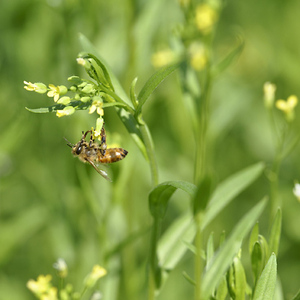Louis Dreyfus, Global Clean Energy promote camelina production

July 12, 2023
BY Global Clean Energy Holdings Inc.
Louis Dreyfus Company (LDC) and Global Clean Energy Holdings Inc. have agreed to jointly promote the sustainable cultivation of Camelina sativa (camelina) in Argentina, Paraguay, and Uruguay. The strategic pairing underpins the expansion of Global Clean Energy’s camelina production activities to South America and reinforces LDC’s position as a supplier of choice for quality seeds among farmers in the region.
Camelina is used as an ultra-low carbon feedstock for renewable fuel production and as an ingredient for high protein animal feed production. New to local agriculture, this oilseed has a short production cycle that allows it to be incorporated into existing crop rotations as a cover crop, while helping to preserve soil health prior to sowing summer crops such as corn or soy.
“The addition of Global Clean Energy’s camelina varieties to LDC’s seed portfolio also represents another positive step in LDC’s global sustainability journey, as camelina oil is a feedstock for the production of renewable biofuels, thus contributing to the global energy transition,” said Pablo Autilio, LDC’s global Head of Seeds.
Advertisement
Advertisement
Under the agreement, LDC and Global Clean Energy will work exclusively on the origination and processing of camelina in Argentina, Paraguay, and Uruguay. Building on its existing production in North America and Europe, Global Clean Energy will manage seed breeding operations to improve camelina varieties in the region, supply camelina seed, and provide agronomic support to farmers participating in the program. LDC will manage origination activities and contracts with farmers ensuring that all production has the corresponding sustainability certification, as well as post-harvest logistics and processing into meal and oil. Camelina meal will be used in the production of animal feed while camelina oil will be processed into renewable fuels, which will ultimately reduce carbon emissions in transportation and aviation sectors in the region and around the world.
LDC and Global Clean Energy representatives have already held six technical conferences with more than 200 agricultural producers in Argentina, sharing key crop characteristics and insights on crop management, as well as a commercial offer for the 2023 harvest.
Advertisement
Advertisement
“After years of development, we are excited to expand the commercial growth of our camelina business into South America through this agreement with LDC,” Global Clean Energy CEO Richard Palmer said. “Camelina represents a unique opportunity for the region to benefit from a crop that generates additional income on idle farmland during the winter, without displacing the main summer crops. Together with LDC, we expect this crop to generate additional revenues for the entire agricultural community in this region, while furthering clean fuel production and improving soil health in the process.”
Global Clean Energy has been working on camelina breeding in North America and Europe for over 15 years. After testing 20 proprietary camelina varieties in Argentina over the last two years, Global Clean Energy has identified the best varieties to market in the region.
Related Stories
Broco Energy on July 17 announced a new partnership with the Massachusetts Port Authority (Massport) to deliver and transition Massport's fuel tanks to renewable diesel across its various facilities.
Shell Aviation, Accenture, and Amex GBT on July 10 announced Avelia is in the process of evolving to an industry solution with independent data hosting and a multi-supplier model helping users access the GHG benefits of SAF.
The U.S EPA on July 17 released data showing more than 1.9 billion RINs were generated under the RFS during June, down 11% when compared to the same month of last year. Total RIN generation for the first half of 2025 reached 11.17 billion.
The U.S. EPA on July 17 published updated small refinery exemption (SRE) data, reporting that six new SRE petitions have been filed under the RFS during the past month. A total of 195 SRE petitions are now pending.
European biodiesel producer Greenergy on July 10 confirmed plans to shut down its biodiesel plant in Immingham, Lincolnshire, U.K. The company temporarily suspended operations at the facility earlier this year.
Upcoming Events










